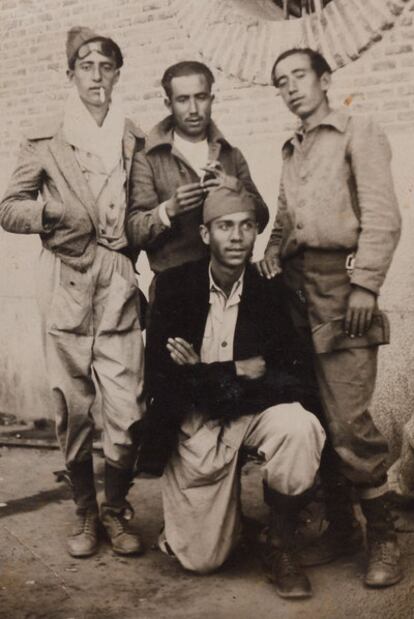Paralyzing a poetical legacy
Row erupts over writer Miguel Hernández's papers as Elche council rescinds deal
The legacy of the poet Miguel Hernández - 250 boxes containing over 5,000 documents ranging from letters and manuscripts, to books and some paintings - is languishing in obscurity. The new team in Elche's city council, led by Mercedes Alonso of the Popular Party (PP), has rescinded the deal made with the author's heirs last year on economic grounds, thereby eliminating the institutional protection his work enjoyed. The writer's documents, which were publicly available at the local library pending the completion of a new museum, are now inside a bank safety deposit box until further notice.
Hernández, who died in 1942 at the age of 31, posthumously became a leading figure of 20th-century literature through works such as El rayo que no cesa and the famous poem Nanas de la cebolla (or, Onion lullaby), based on a letter his wife sent him saying all she and their baby had to eat was bread and onions. For a long time, Hernández was hailed as a hero by the Spanish left because he fought on the Republican side during the Civil War and died in prison from diseases brought on by the poor living conditions.
Last year, the Socialist government of Elche, in Alicante province, reached a deal with Hernández's heirs to pay them a substantial sum of money in exchange for the continued public use of his legacy. A Miguel Hernández foundation and museum were to be created that would partly recoup this money.
But now, the new center-right PP government has said that 3 million euros over the next 20 years in exchange for keeping the documents on public display in Elche is too much to pay. The family has reacted by taking all the documents back and putting them in a bank safe until the courts decide on the matter.
"This is a sad day," said Lucía Izquierdo, the poet's daughter-in-law and main spokeswoman for the family. "They are forcing us to take [the legacy] away because they did not pay what had been agreed to." The family claims that it was entitled to 84,000 euros annually, besides the 150,000 euros a year agreed to for the foundation. When that deal was signed last year, Izquierdo said in a public statement that "to us [the heirs], the literary legacy of Miguel Hernández makes no sense if it does not remain right here in Elche. Although he [the poet] was born in Orihuela, he was from Elche."
Elche's culture commissioner, Pablo Ruz, lamented the family's decision to take back the Hernández legacy, but insisted that the city is "incapable" of payingthree million euros. He also said the National Library has assessed the value of the documents at 1.6 million euros. The municipal budget is around 250 million euros.
"It's not an economic issue, it's a political decision," asserted José Carlos Rovira, a literature professor and former curator of the Miguel Hernández Year, celebrated last year to observe the 100th anniversary of the poet's birth. "This is a show of contempt for the poet, and it is deplorable that the new government did not even meet with the heirs to try to negotiate."
The family's lawyer, Carlos Candela, went further and called the PP's decision "political revenge."
"First they removed the name of [leading Communist leader] La Pasionaria from a local garden, and named an avenue after a fascist [Vicente Quiles], right before throwing Miguel Hernández's legacy out the window," he said, in reference to the new team's recent and controversial moves aimed at eliminating all left-wing references from the city.
On Monday, the descendants of Miguel Hernández began supervising the transfer from the local library to a bank whose name remains undisclosed for security reasons. The family will also sue the city for breach of contract and dignitary tort on the part of some PP councilors.
The Hernández legacy has been in Elche for the past 27 years despite an ongoing row with the authorities of Orihuela, the birthplace of the poet, over who gets to keep his work. Only last year, with the centennial celebrations in full swing, Orihuela and Elche fought over the issue, with the family reportedly accepting the highest bid. Now, it seems like nobody wants his work after all.
"This is an irreparable damage to the poet; all the planned activities and all the research have been paralyzed," said Izquierdo, who also complains that some media have sought to portray the family as greedy for demanding economic compensation in exchange for surrendering the legacy to the public sphere.
The former mayor of Elche, Alejandro Soler, who signed the original agreement with the family, called the new local team's decision "a historical mistake" and the result of "a government with a low intellectual, cultural and moral profile."

Tu suscripción se está usando en otro dispositivo
¿Quieres añadir otro usuario a tu suscripción?
Si continúas leyendo en este dispositivo, no se podrá leer en el otro.
FlechaTu suscripción se está usando en otro dispositivo y solo puedes acceder a EL PAÍS desde un dispositivo a la vez.
Si quieres compartir tu cuenta, cambia tu suscripción a la modalidad Premium, así podrás añadir otro usuario. Cada uno accederá con su propia cuenta de email, lo que os permitirá personalizar vuestra experiencia en EL PAÍS.
¿Tienes una suscripción de empresa? Accede aquí para contratar más cuentas.
En el caso de no saber quién está usando tu cuenta, te recomendamos cambiar tu contraseña aquí.
Si decides continuar compartiendo tu cuenta, este mensaje se mostrará en tu dispositivo y en el de la otra persona que está usando tu cuenta de forma indefinida, afectando a tu experiencia de lectura. Puedes consultar aquí los términos y condiciones de la suscripción digital.








































